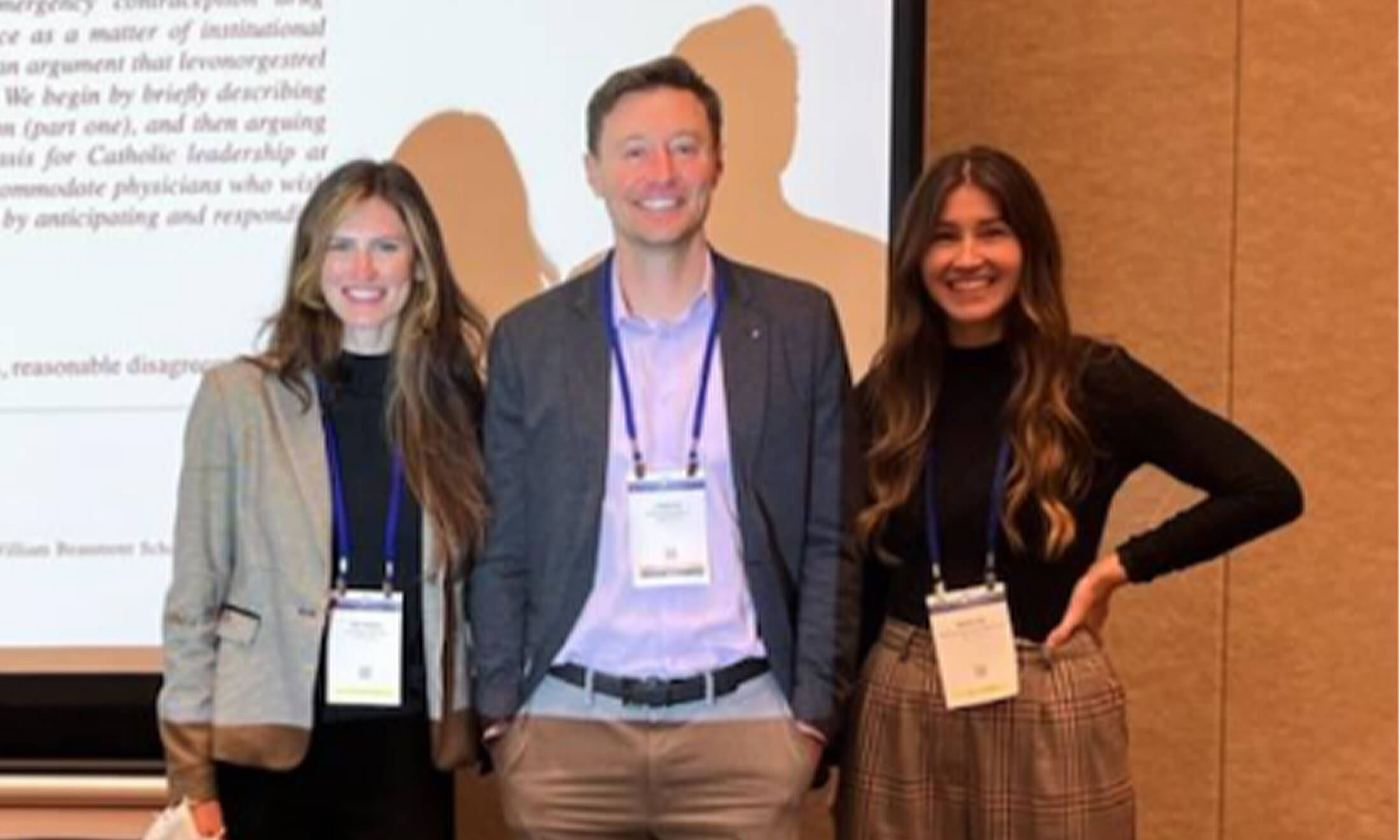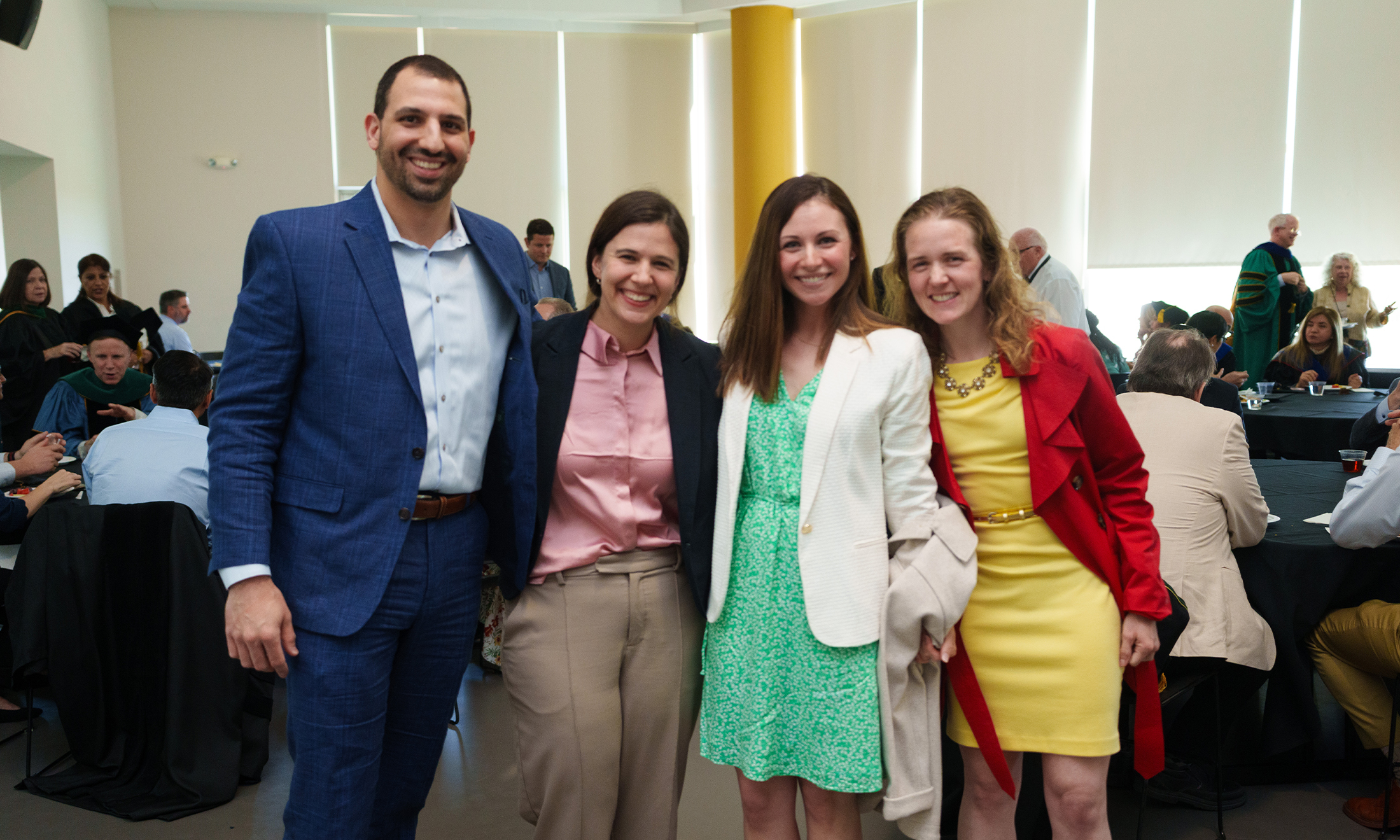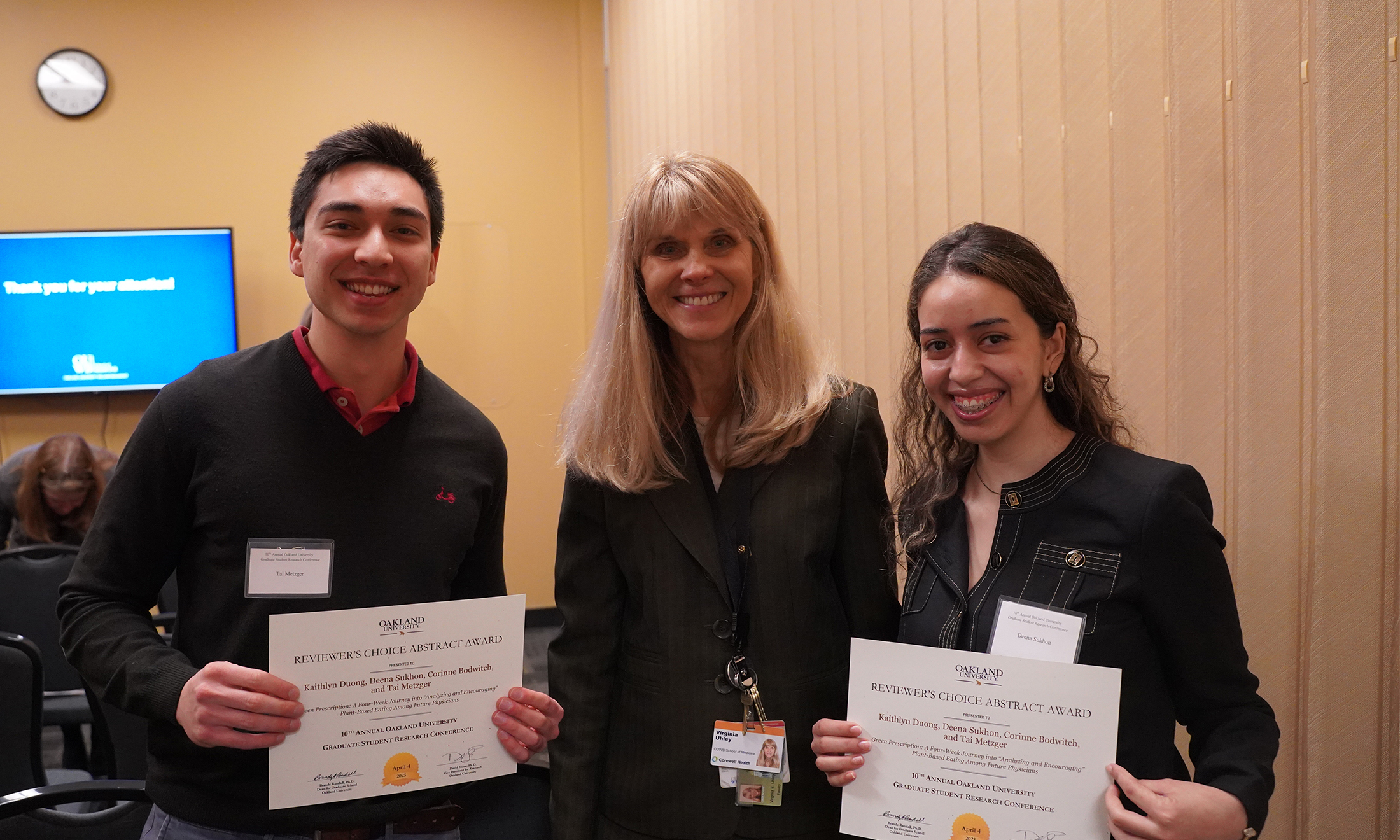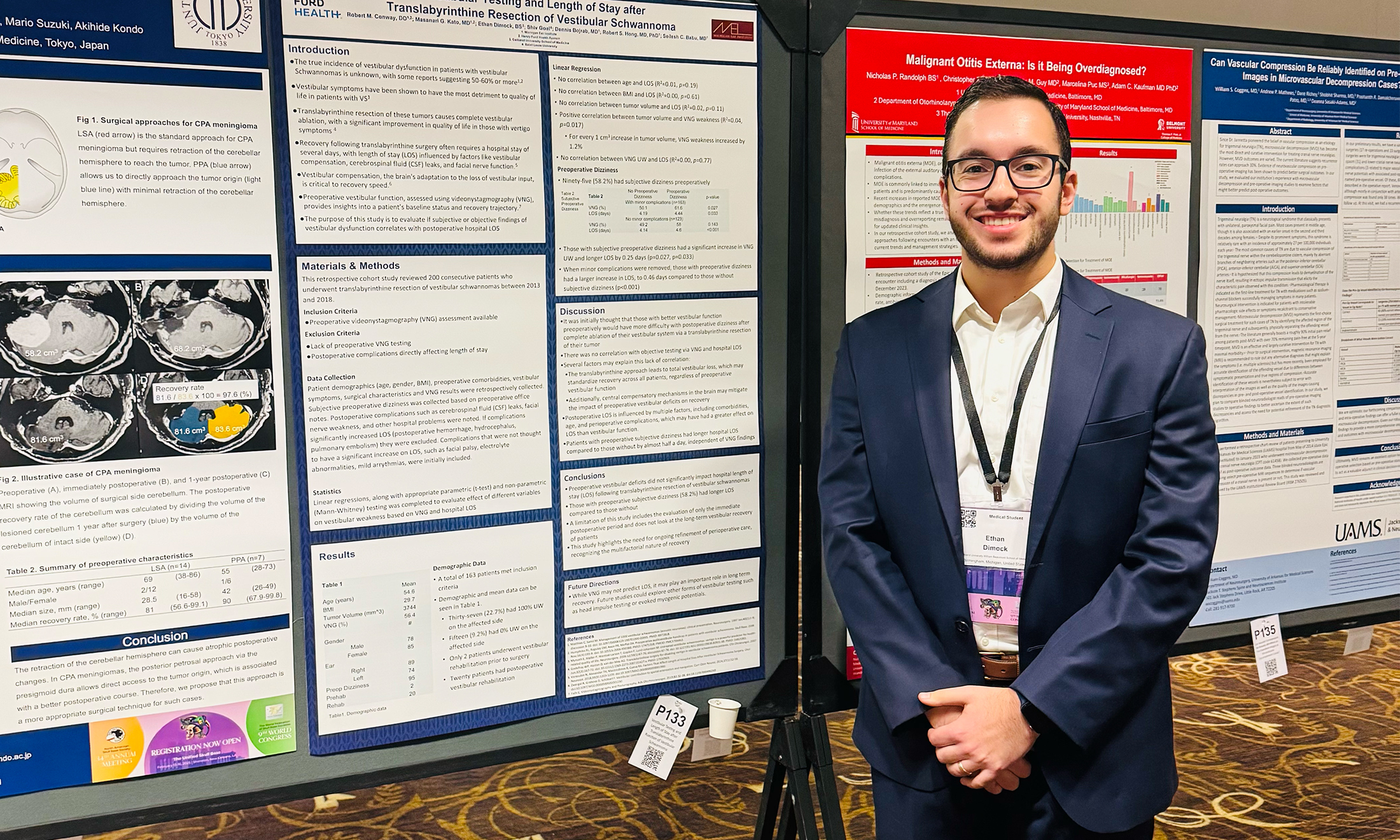‘Incredible opportunity and experience’
OUWB has strong showing at nation’s largest bioethics and humanities conference
When the largest national conference in the U.S. for bioethics and humanities occurred in late October, Oakland University William Beaumont School of Medicine was well-represented.
Two OUWB cohorts of faculty members and medical students presented at The American Society for Bioethics and Humanities 24th Annual Conference held Oct. 26-29 in Portland, Oregon.
One cohort included M2s Garrett Peters and Amanda Bachand with Jason Wasserman, Ph.D., professor, Department of Foundational Medical Studies (FMS), who shared their presentation, “Holocaust and Medicine Education: Educational Impact of a Study Trip to Auschwitz.”
The second group, M3s Marlee Mason-Maready and Victoria Whiting with Abram Brummett, Ph.D., assistant professor, FMS, presented “Catholic Hospitals Should Permit Physicians to Provide Emergency Contraception to Rape Victims as an Act of Conscientious Provision.”
“Seeing our OUWB students grow and excel in bioethics is about the greatest gift I can hope to ever receive as an educator,” said Brummett. “I'm just so proud of Marlee and Tori for everything they have done with this project.”
Wasserman had similar thoughts about Peters and Bachand.
“Garrett and Amanda did an amazing job,” he said. “They were able to convey why the trip was important to them and how they think it will impact their careers. They were poised and presented very well and I'm proud of how they represented OUWB and our Holocaust and Medicine Program.”
‘An incredible opportunity and experience’
Presenting at a conference like ASBH was a first for Peters and Bachand.
The two were among the cohort of more than 20 students, faculty, and administrators who traveled to Poland for a week in June through the school’s first study trip to Auschwitz, which is part of OUWB’s Holocaust and Medicine program. (A webpage dedicated to the program can be found here.)
Students learned about Jewish heritage and history, the extent of the Holocaust and how physicians reacted on all sides, took part in reflective writing sessions, read testimonials, and began developing plans to share what they learned with others. The overall goal was to prompt students to reflect on the implications of the Holocaust for one’s own personal and professional development within the medical profession.
| More from OUWB |
|
‘Life-changing’: OUWB students return from study trip to Auschwitz ‘Honored and proud’: Donors, OUWB students and officials reflect on Study Trip to Auschwitz |
Wasserman said he views it as a positive that the trio was able to talk about how the trip factors into OUWB’s Holocaust and Medicine program.
“The Health Professions Education affinity group is made up of individuals who have a particular interest in bioethics- and humanism-related education so it was nice to be able to showcase the study trip to Auschwitz for that group of people,” said Wasserman.
“The program itself is exciting and we've been successful at fundraising and launching the trip, but we also want to let people know about the curriculum we've designed and the teaching methods we're using to ensure that the trip has the greatest impact possible on our students.”
“It was good to be able to highlight that angle of what we do,” he added. “And having the students be able to attend and speak to their own experiences first-hand was really exciting.”
At the conference, Peters said Wasserman provided a brief overview of the trip that highlighted the various aspects, from museums that were visited to hearing a survivor speak and touring Auschwitz.
The students provided additional insight on why they wanted to go on the trip, and some of the experiences they had that were particularly impactful.
“Being able to use all of the things that we learned on the trip, and share those with other educators and people who can really make an impact on the next generation of physicians was an incredible opportunity and experience,” said Bachand.
Peters said he believes sharing their experiences is especially important on a topic like the Holocaust and medicine.
“The trip didn’t have a lot of tangible aspects…there’s no data,” he said. “It’s pretty much how you felt and what you can bring into your life. That is something that we can share with people.”
‘Welcome and supported’
Mason-Maready and Whiting presented on an argument that they wrote with Brummett that was published earlier this year in The Linacre Quarterly, the peer-reviewed, official academic journal of the Catholic Medical Association.
Essentially, the paper argues that the presence of reasonable disagreement among Catholics and Catholic hospitals on the topic of emergency contraception for rape victims provides a good reason for Catholic leadership to accommodate physicians who wish to provide it as a matter of conscience. (More about the argument can be found here.)
“It will still be legal to give emergency contraception, (but) some Catholic hospitals will refuse to do this, and we are giving them a reason to reconsider their view,” said Brummett earlier this year.
The topic is especially timely in light of the U.S. Supreme Court’s decision that overturned Roe v. Wade, the 1973 abortion rights case that served as a precedent in reproductive rights cases for nearly 50 years — and has thrust women’s reproductive rights into headlines.
That’s also a big reason why it made sense for the topic to be presented at ASBH.
“The issue of clinician conscience in health care is of renewed interest…namely, there is renewed interest in positive conscience claims, or clinicians who want to do something, rather than refuse to do something, on the basis of conscience,” said Brummett.
“In short, the argument is very timely, and this is why it was of interest at a national conference,” he added.
Brummett said the argument made by he, Mason-Maready, and Whiting has generally been well-received.
Presenting it at a conference is particularly useful for the students because they get to network, practice presentation skills, gain “invaluable experience doing bioethics at the highest level,” and get exposure to a wide array of topics in contemporary bioethics.
“My biggest takeaway was a sense of appreciation for the openness and constructive character of the bioethics community that I experienced at ASBH,” said Mason-Maready. “Despite being a medical student and feeling anxious about presenting on such a sensitive topic…I felt welcome and supported by the people I met.”
Overall, she called it a “fantastic experience” and said she’d highly encourage her colleagues to take similar opportunities.
Brummett said it also helps build OUWB’s reputation.
“(The students’) work is building our reputation as a medical school that produces physicians who are not only exposed to bioethics during medical school, but actually contributing to professional bioethics scholarship,” he said. “They have manifested the beating heart of our school's mission, vision, and values with this work.”
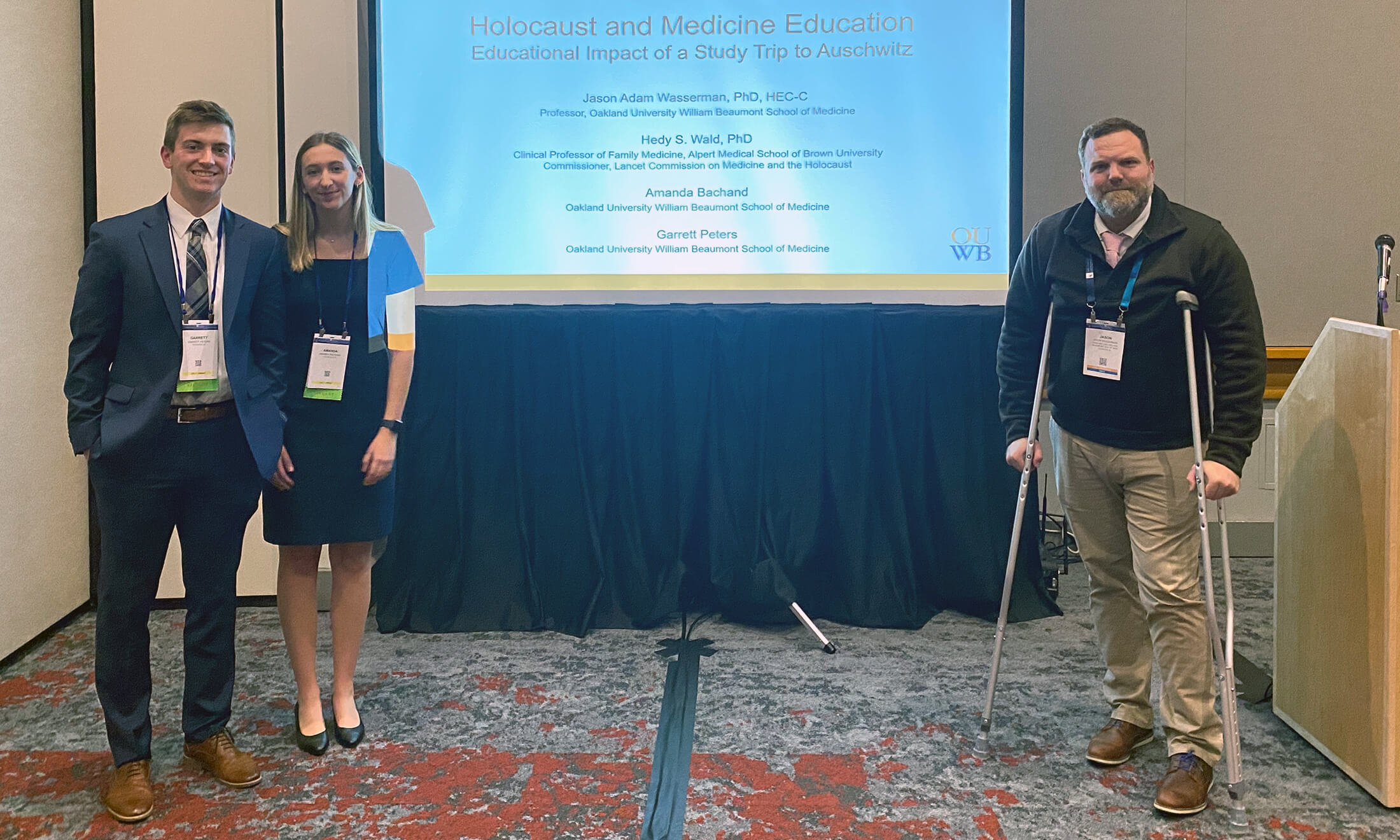
 December 21, 2022
December 21, 2022
 By Andrew Dietderich
By Andrew Dietderich